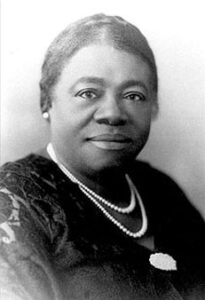
In anticipation of the Florida Classic, there is a lot of banter between rival schools Florida A&M and Bethune-Cookman. Mary McLeod Bethune, B-CU’s founder, and unofficial mascot, has been the target of many jokes.
Although the banter is out of love and healthy competition, McLeod Bethune is underrated and not truly admired and respected as the trailblazer she is.
The story of Mary McLeod Bethune is a long story of triumph and progress with lessons from which others can benefit.
Born on July 10th, 1875, to formerly enslaved people as the last of 17 children, she and her family picked cotton in a small town in South Carolina. She gained the opportunity to start her educational journey due to the reconstruction efforts to educate African Americans and attended Scotia Seminary, a private boarding school for girls.
She then continued her education focused on mission work, which later led her to teach.
On Oct. 3, 1904, Bethune opened the Daytona Beach Literary and Industrial School for Training Negro Girls, a boarding school that she grew from $1.50. Stories are told of her going door to door asking for nickels and dimes, supplies and food that could support her school and vision for educating young Black people.
The school advanced and eventually became a college that later merged with the Cookman Institute in 1929. The school became accredited in 1931 by the Association of Colleges and Secondary Schools of the Southern States, then officially changed to Bethune-Cookman College, making Bethune the first Black woman to serve as a college president.
As the president of Bethune-Cookman, she made it her mission to see the vision come to fruition. Through her acts, she became a pioneer of grassroots organizing. She rallied and inspired small donors within the Black community to support her students.
Outside of her educational endeavors, Bethune was heavily involved in many efforts aimed at improving the quality of life for Black people. She fought for ending segregation in schools, improving healthcare for Black people, and women’s right to vote. Her work propelled her to be elected president of the National Association of Colored Women (NACW) in 1924, but later she wanted to do even more than what the NACW could offer. Bethune wanted to push women to become advocates for social change.
On Dec. 5, 1935, she created the National Council of Negro Women, Inc. (NCNW), growing the organization’s membership to 850,000, exceeding 4 million today.
Bethune’s dedication brought her national recognition, being elected vice president of the National Association for the Advancement of Colored People (NAACP) and the National Urban League. Her many titles and experience gained the attention of U.S. President Coolidge, later Hoover and Roosevelt. Bethune famously impacted President Roosevelt and his wife Eleanor, prompting him to create the Division of Negro Affairs and appoint her the director, making her the first Black woman to head a federal agency.
Despite the many positions she held, Bethune did not lose focus. She continued her work as president at Bethune-Cookman while also leveraging her network and organizational titles to advocate for a better quality of life for all Black people in the U.S. With finances being a barrier to education, she co-founded the United Negro College Fund, a philanthropic organization that still benefits students today.
As a politically savvy relationship builder, Bethune played the political landscape to her advantage. She is credited with converting Black voters from the Republican party to the Democratic. As skilled as she was at rallying the Black community, she was just as skillful at convincing social elites to follow her lead. Knowing her image was imperative to her school’s success, she claimed to be a widow rather than admit divorce.
After appointing Mrs. Roosevelt to the Bethune-Cookman College Board of Trustees, Bethune wrote to President Roosevelt: “We are now in desperate need of funds. My nights are sleepless with this load upon my heart and mind. I must have help. I believe there are friends who would want to help.”
Bethune shamelessly requested money for Bethune-Cookman from her connections. There are many letters sent by Bethune detailing the financial situation of her college that end in directly asking potential donors for a specific amount of money.
Towards the end of her life, her true level of dedication was shown in Bethune’s last will and testament that details the Mary McLeod Bethune Foundation, where she deeded her home and her possessions to the foundation.
After her passing, Bethune still makes waves. She became the first African American to be represented with a state statue in the National Statuary Hall Collection at the U.S. Capitol. Additionally, her statue in Lincoln Park in Washington, D.C., was the first memorial to honor an African American and a woman in a public park in the nation’s capital.
While her vision and legacy are still being fulfilled, many lessons can be learned from Mary McCloud Bethune.